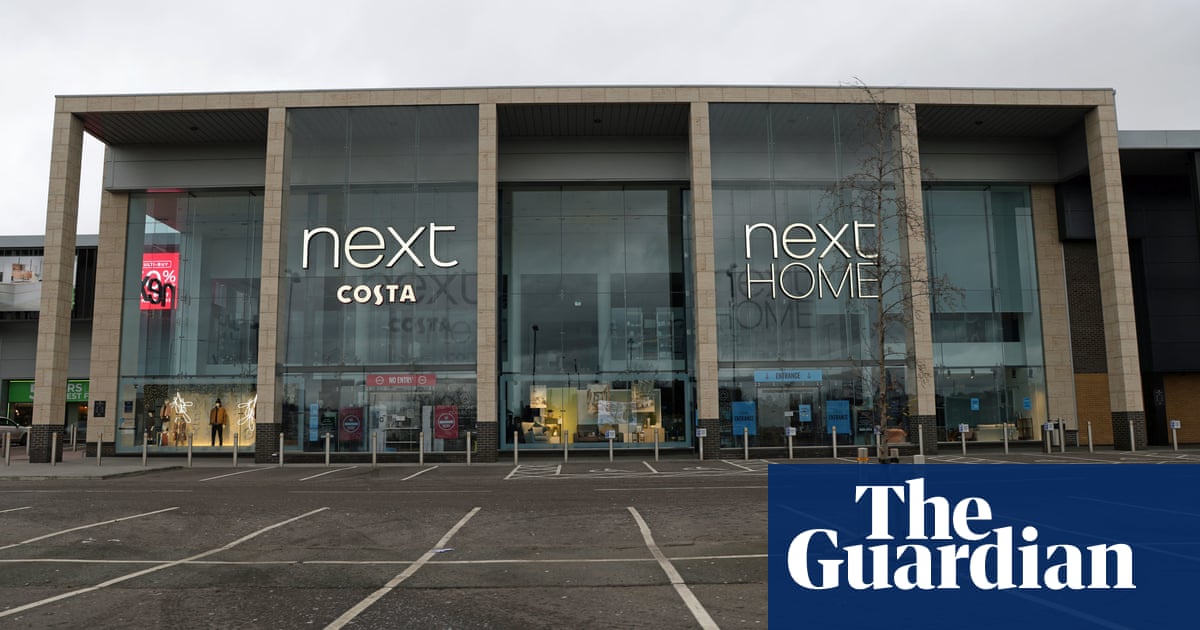
Next has emerged as a winner from a tough Christmas period as sales transferred from shuttered stores to its website, but the fashion chain warned new lockdown measures would wipe out the extra profit it had made.
The retailer’s chief executive, Simon Wolfson, said the £28m of additional profit it had made from better than expected sales in November and December would be almost entirely cancelled out by the impact of shutdowns during the important Boxing Day sales period as well as new restrictions in England and Scotland which complete the closure of the 500 store chain.
The new lockdown had seemed “inevitable”, said Wolfson, adding that while it was easy for people to feel angry with the government, the real culprit was the virus. “What I will be very disappointed by is if we don’t pull every lever to roll out the vaccine as quickly as possible,” he said.
Investors reacted positively to Next’s Christmas trading update, pushing its share price up nearly 10% to more than £75 in early trading on Tuesday, close to the record high of £79.27 set in 2015. By midday Next’s share price was up more than 5% at £72.80 – still the best performer in the FTSE 100.
By contrast, the worst performer was Associated British Foods (ABF), owner of Next’s high street rival Primark, which has no online sales operation. News of the new national lockdown in England pushed ABF shares down nearly 3% to about £21.60 by midday on Tuesday.
Next said the pandemic was also delaying stock deliveries from Asia as there was a shortage of freight containers. “It is not getting it into the country that’s the problem; it’s getting it into a container at the other end,” Wolfson said.
The retailer said many of its deliveries were running two to three weeks late, meaning stock levels were 10% lower than two years ago. All departments were being affected but it would be a much bigger problem if its stores were open, Wolfson said, with stock expected to “return to more normal levels by the end of March”
“I don’t think if you went on to our site you would go, ‘My gosh there’s nothing here’,” said Wolfson. “On some of the best-selling lines we are thinking ‘We wish we had more of that’ but it’s on the water and should be with us in three weeks time. The stock problem and the store closure problem to a degree mitigate each other.”
Sales in the nine weeks to 26 December were 1.1% lower than in 2019 – a far better outcome than the drop of 8% pencilled in by the company back in the autumm. While UK store sales tumbled 43% its online sales were up 36%.
The company said the closure of about half its shops had limited its ability to clear discounted stock after Christmas. It would be able to clear about a quarter of it through its website; however, it would cost the company £5m more than selling it in its shops. The remainder will be sold in its outlet stores.
At the start of the Covid crisis, Next had predicted the pandemic would have a disastrous impact on its finances, but sales have held up better than it anticipated, boosted by demand for new home furnishings, loungewear and children’s clothing.
Indeed Next is forecasting profits of £670m for the coming year despite assuming its stores will be closed in February and March, which would be within 10% of pre-pandemic levels.
Wolfson also confirmed Next was part of a consortium bidding for some of the fashion brands owned by Sir Philip Green’s stricken Arcadia group but it would not take a majority stake in any deal. The Topshop and Topman owner went into administration in November putting 13,000 jobs at risk.
“We are only interested in the brands that we think are very, very good,” said Wolfson. He suggested if the consortium won it would result in a similar set-up to the one struck for lingerie brand Victoria’s Secret, where Next operates the stores and website on its behalf.
Next has proved itself to be one of the industry’s most resilient retailers. Its shares have recovered strongly from the collapse seen last year when the UK first went into lockdown.
Years of investment in its home shopping business had enabled Next to weather the storm, said Richard Lim, chief executive of analysts Retail Economics. “These results are likely to set the tone for a polarised view of the retail sector which separates those with impressive online capabilities with those that do not.”
from WordPress https://ift.tt/393UEgD
via IFTTT

0 Comments